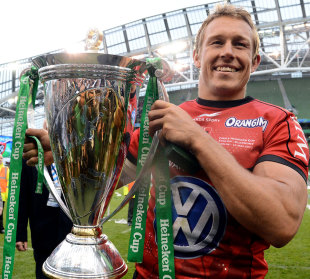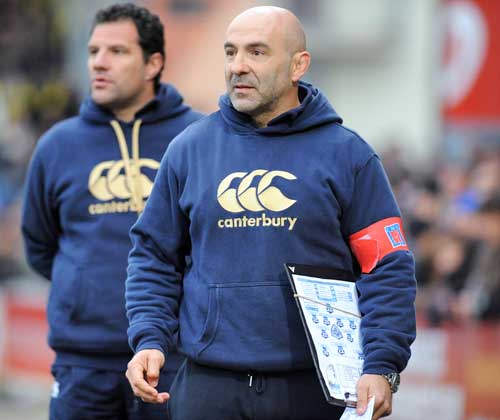|
Toulon v Castres, Top 14 Final, Stade de France, Paris, June 1
Wilko and Toulon target rare double
Ian Moriarty
May 30, 2013

Can Toulon and Jonny Wilkinson make it a Heineken Cup and Top 14 double?
© Getty Images
Enlarge
Toulouse coach Guy Noves said it could never be done again. Vern Cotter, former coach (according to some reports) to the continent's finest attacking side will tell you how difficult it is to win one final, never mind two. Instead, it is Bernard Laporte's band of merry men who stand 80 minutes from becoming the first French team in nearly 20 years to win the double.
Double Delight
Facing them will be Castres Olympique; a club with a wage bill half of Toulon's and many pundits tip to be relegation fodder only a few seasons ago. To borrow Jimmy Greaves' over-used punch line, 'it's a funny old game'. Let's start with the good news. This year's French Championship final will break with recent history and be the first final of the professional era without a Toulouse, Clermont, Stade Francais or Biarritz involved. Ironically, the last time none of these sides made a final was in 1993, when Castres defeated Grenoble 14-11. With the greatest of respect to France's top sides, it'll be nice all the same to have a different name etched on the Bouclier de Brennus come Saturday night. Up to the plate once again steps Castres, a club finally rewarded for being there or thereabouts in the play-offs over the last few years. On Saturday evening, they will be aiming for their fourth French title in their first appearance since 1995. Coaches Laurent Labit and Laurent Travers, who will depart the Tarn for the bright lights of Paris and Racing Metro next week, have done a magnificent job on a limited budget compared to their opponents. And then there's Toulon. Nobody can claim that their rise back to the summit of French rugby has been anything other than incremental. This is their fifth season back in the Top 14, having spent much of the previous decade yo-yoing between divisions. There's been Challenge Cup finals and domestic play-off finishes, followed by a Top 14 final loss to Toulouse last year and eventually a first major trophy in the form of the Heineken Cup a few weeks ago. There has been a constant progression under Laporte, who above all of owner Mourad Boudjellal's pricey acquisitions, seems to have been the most astute. Moulding a collection of rather expensive imports into a superbly drilled team isn't always as easy as it looks - ask Guy Noves or Vern Cotter - but the former France boss has exceeded expectations down south. Like the national side he coached between 2000 and 2007, Toulon play bland, 'pragmatic' rugby but their defensive organisation is inspired, and they don't give away penalties in the red zone. Of course, it helps when you have a veritable phalanx of experienced and hugely able warriors in your side that won't panic under pressure.
How much Castres or Toulon can thank Clermont Auvergne for their good fortune is a moot point. Putting Les Jaunards' shocking second half implosion in the Heineken Cup final to one side, you can only play the team in front of you. Castres certainly must have thought as much last weekend when they put a visibly shell-shocked Clermont side to the sword in Nantes. Sadly, Castres' appearance in Saturday's final could represent a final hurrah at this level for the one horse towns of French rugby. While the club's very presence in the final will hearten those thought that those days were already over, it's growing increasingly unlikely that we will see any more 'traditional' small town clubs of the south west follow in Castres' footsteps without a sizeable cash injection. However, it is also important to remember that Castres would have already gone the way of Bourgoin, Auch, Montauban, Narbonne, Colomiers and Beziers, had it not been for the sizeable financial support gifted to them by their backer Pierre Fabre. The unassuming multi-millionaire pharmaceuticals mogul bought his home town club in 1988, investing enough to lead it to a title in 1993 (its first since 1950), and allowing the club to enjoy over two decades of top flight rugby. Nevertheless, in stark contrast to Boudjellal and Toulon, Fabre has been faced with putting ever increasing amounts of money into the club in order to keep in touch with the top sides. Drawing similar parallels to Bourgoin a few years ago, locals worry about the future of the club when Fabre - now in his 80's - is no longer there to prop them up. Toulon have none of those worries. Boudjellal claimed earlier this season that the financial performance of the club meant he no longer needed to put his own cash in. Whatever you think about his penchant for throwing verbal grenades in the media from time to time, his management from a commercial point of view has been impressive. Toulon have increased their turnover by 500% during his tenure, allowing the club to spend right up to the limit of the salary cap. If there is a major question mark over Toulon on Saturday, it is whether they will be able to turn in another huge performance after the two big recent efforts against Clermont and Toulouse. The club are by some distance the oldest side to appear in a Top 14 final in the professional era (with an average age of 32), and there must be a question mark if they will be able to last the pace if the game is tight. Guy Noves' rationale for the double being unattainable was based on the fact that it was impossible to have the reserves and resources to win a European final, a French domestic semi-final and final in quick succession. Do Europe's old-age pensioners have enough left in the tank for one last push for glory? 
Can Castres' coaches Laurent Travers (R) and Laurent Labit (L) bow out on a winning note? © Getty Images
Enlarge
© ESPN Sports Media Ltd.
| |||||||||||||||
Live Sports
Communication error please reload the page.
-
Football
-
Cricket
-
Rugby
-
- Days
- Hrs
- Mins
- Secs
F1 - Abu Dhabi GP
Abu Dhabi Grand Prix December 11-131. Max Verstappen ()
2. Valtteri Bottas (Mercedes)
3. Lewis Hamilton (Mercedes)
4. Alexander Albon ()
5. Lando Norris ()
6. Carlos Sainz Jr ()
-
ESPNOtherLive >>
Darts - Premier League
Golf - Houston Open
Snooker - China Open
Tennis - Miami Open

